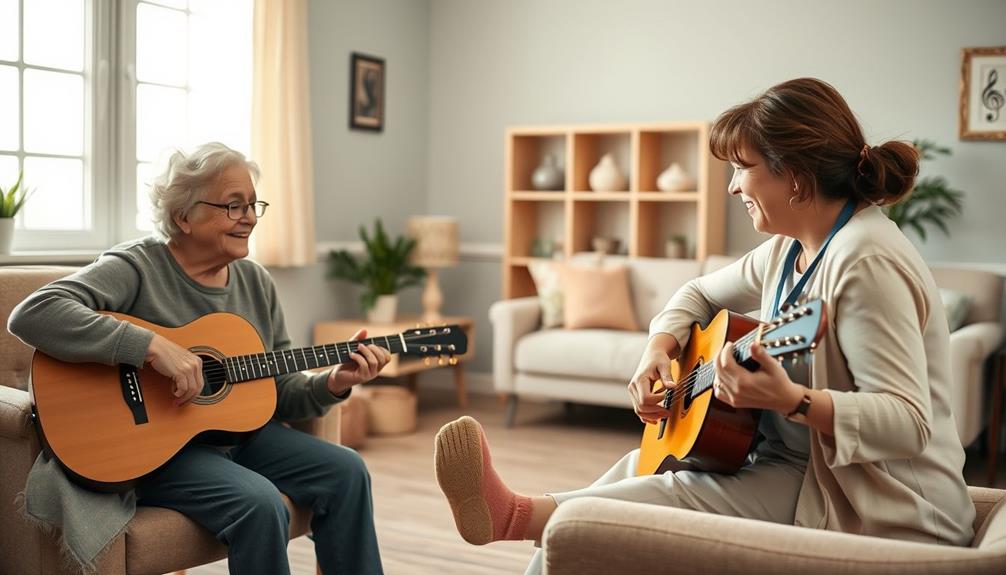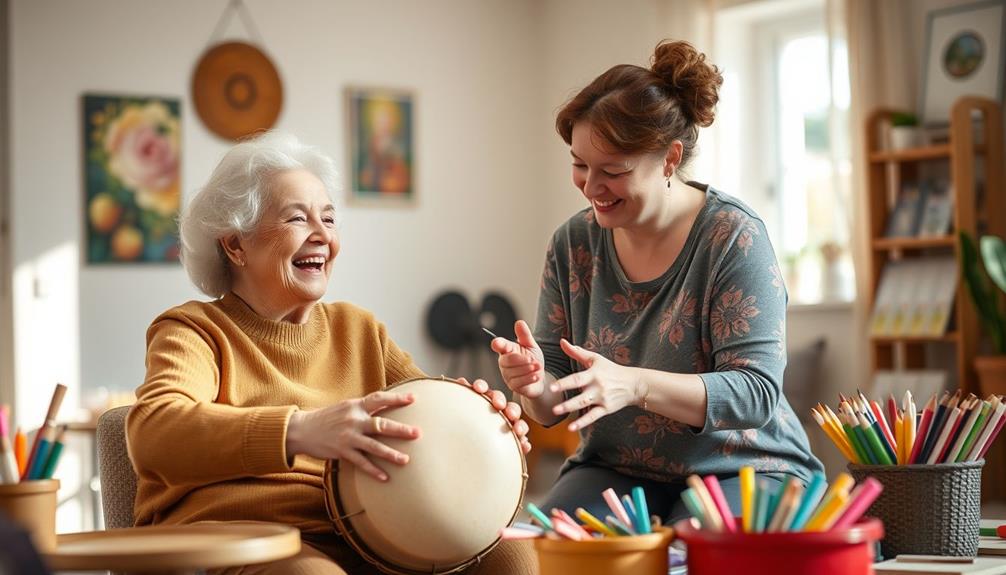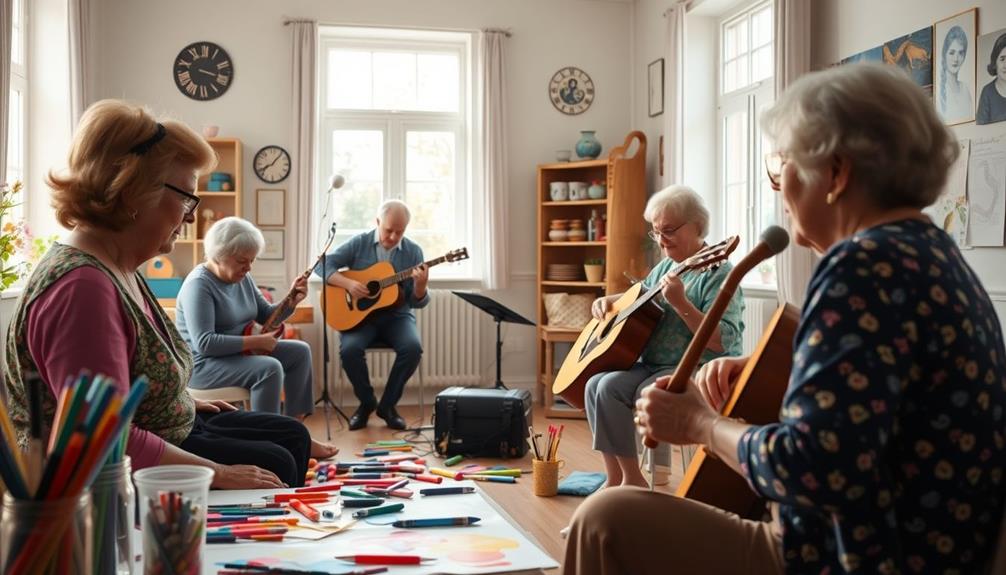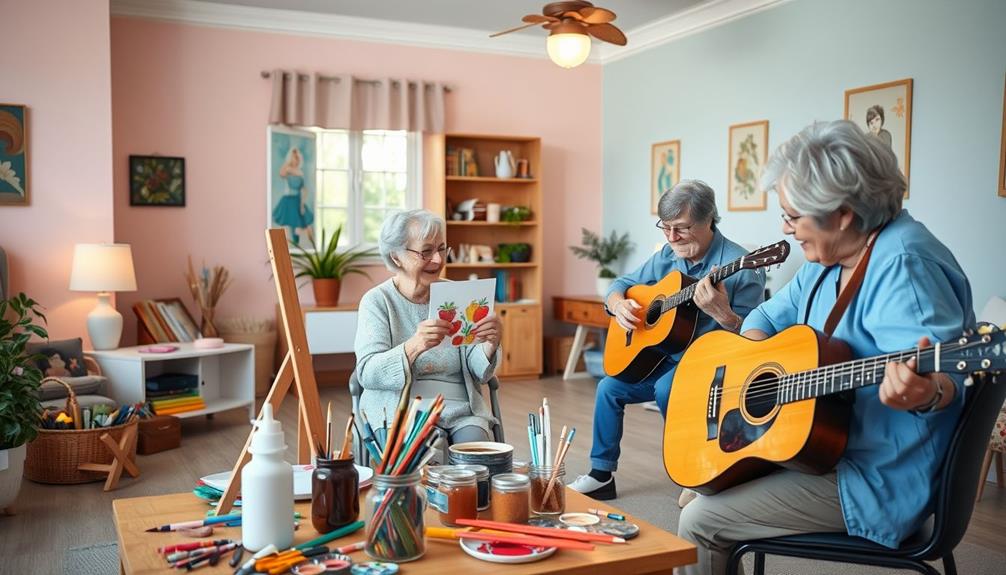Art and music therapy have been shown to provide significant benefits for individuals with dementia, improving their emotional well-being and cognitive functions. Incorporating familiar songs can boost mood and alleviate anxiety, while engaging in art projects can help individuals communicate their feelings when words fail them. To effectively utilize these therapies, it is important to create a calming atmosphere, select music that is meaningful to the individual, and facilitate simple art projects that promote personal expression. Encouraging movement through rhythm and promoting social interactions can also strengthen connections and enhance communication. These methods have the potential to enhance overall quality of life for dementia patients. Delve deeper into these transformative therapies to gain further insights and discover more effective strategies.
Key Takeaways
- Music therapy enhances mood, reduces anxiety, and stimulates memory through familiar tunes, promoting emotional connections and cognitive engagement.
- Art therapy provides a means for self-expression, helping dementia patients communicate emotions and thoughts when verbal expression becomes challenging.
- Combining music and art therapy improves overall well-being by reducing agitation and fostering social interaction among dementia patients.
- Tailoring activities to individual preferences enhances the effectiveness of therapies, ensuring engagement and enjoyment in creative processes.
- Resources such as the Alzheimer's Association offer support and education for caregivers to implement art and music therapy effectively.
Understanding Dementia and Its Challenges

What makes dementia such a challenging condition to navigate? With around 50 million people affected worldwide, dementia, particularly Alzheimer's disease, considerably impacts memory and cognitive function. By 2050, projections suggest that one in six individuals aged 65 and older will face this intimidating reality.
As a caregiver or family member, you may witness firsthand the profound emotional toll this condition takes on both patients and loved ones. Developmental milestones and cognitive decline often coincide, leading to complex emotional responses that require understanding and empathy.
Communication often becomes a struggle, leading to feelings of frustration and isolation. This can diminish the quality of life for those diagnosed, as their ability to express needs or emotions wanes. In addition, Alzheimer's disease is the sixth leading cause of death in the U.S., affecting one in ten Americans aged 65 and older.
Understanding these challenges is vital for developing effective interventions and support systems. You'll find that being aware of the emotional and cognitive hurdles faced by individuals with dementia can help you provide more compassionate care.
Benefits of Music Therapy

Music therapy can greatly boost mood and reduce anxiety, helping you or your loved ones feel more at ease.
Engaging with familiar tunes not only stimulates memory but also encourages movement, making sessions lively and interactive.
Additionally, regular music sessions can aid in pain management and relaxation, enhancing the overall well-being of dementia patients music therapy integration.
These benefits combine to create a more fulfilling and connected experience for dementia patients.
Mood Enhancement
Through the power of music therapy, dementia patients often experience significant mood enhancement and reduced anxiety. Engaging with familiar tunes, such as those found in uplifting songs like Blue Skies and Lemonade, can spark memories and create emotional connections, which is particularly valuable in the later stages of dementia. This connection helps cultivate a more positive emotional state.
Listening to or singing along to music stimulates the release of dopamine and serotonin, which are essential for improved mood and emotional well-being.
Active participation in music activities, like clapping or dancing, encourages physical movement and social interaction, making the experience even more rewarding.
As you consistently incorporate music therapy into daily routines, you'll likely notice a gradual improvement in overall engagement and communication abilities.
This can enhance not just the mood but also the quality of life for dementia patients.
Memory Stimulation
Engaging in music therapy can spark powerful memories for dementia patients, offering a unique avenue for memory stimulation. Research shows that musical memory often remains intact, even as other cognitive functions decline. When you play familiar tunes or sing along, you're activating neural pathways associated with memory, which can improve verbal fluency and communication skills.
Here's a quick overview of the benefits of music therapy for memory stimulation:
| Benefit | Description | Connection to Alzheimer's |
|---|---|---|
| Enhanced Mood | Reduces anxiety and provides emotional outlets | Improves overall well-being |
| Memory Recall | Stimulates memory through familiar songs | Helps connect with the past |
| Improved Communication | Increases verbal fluency through singing | Aids in expressing thoughts |
| Reduced Agitation | Creates a calmer environment for patients | Benefits both patients and caregivers |
Engagement Through Movement
Movement alongside music can considerably enhance the therapeutic experience for dementia patients. When you incorporate movement into music therapy, it not only boosts physical activity but also uplifts mood and overall health.
Engaging with upbeat tunes can invigorate energy levels, while soothing melodies provide relaxation, addressing their emotional needs effectively. Additionally, incorporating elements such as rhythm and dance can further improve the effectiveness of conventional therapies for dementia patients.
Here are some key benefits of movement in music therapy:
- Increased Physical Activity: Dancing or clapping promotes health and enhances mood.
- Memory Activation: Familiar songs can spark memories, leading to spontaneous movement and self-expression.
- Cognitive Enhancement: Music therapy helps activate neural pathways, improving psychomotor speed and executive functions.
- Reduction of Behavioral Symptoms: Movement reduces anxiety and depression while fostering joy and accomplishment.
How Music Therapy Works

Music therapy works by engaging your loved one's mind, emotions, and body in a way that resonates deeply with them.
You'll notice how familiar songs can spark memories and feelings, while structured sessions encourage movement and social interaction.
Incorporating elements like healthy dog snacks can enhance the experience for pet owners, creating a comforting atmosphere.
This holistic approach not only boosts cognitive engagement but also enhances emotional connections and encourages physical activity.
Cognitive Engagement Strategies
Frequently, music therapy proves to be an effective cognitive engagement strategy for dementia patients. By activating brain regions that remain unaffected by dementia, it supports cognitive functions like episodic memory and enhances verbal fluency. Engaging with familiar melodies can trigger memory recall, even when other cognitive functions have declined. This illustrates how musical memory can persist in dementia patients, offering them a unique way to connect with their past. Moreover, music therapy can reduce agitation and anxiety, creating a calming environment for dementia patients and improving their overall quality of life. As noted in *episode 33 insights on dementia*, music not only offers emotional comfort but also serves as a valuable tool for fostering social interactions, promoting a sense of belonging and connection even in the later stages of the disease. Through this, music becomes both a therapeutic and communicative medium where traditional forms of dialogue may no longer suffice.
Additionally, incorporating essential oils for relaxation can further enhance the calming environment during music therapy sessions, promoting a more effective engagement.
Here are some key benefits of music therapy for cognitive function:
- Memory Recall: Familiar tunes can evoke memories that seem lost.
- Enhanced Communication: Integrating melodies and lyrics aids in improving communication abilities.
- Behavioral Improvement: It can reduce anxiety and depression, alleviating behavioral and psychological symptoms.
- Gradual Engagement: Consistent sessions lead to gradual improvements in overall cognitive function.
Incorporating music therapy into dementia care not only enriches the lives of patients but also serves as a complementary treatment, fostering better engagement and enhancing their cognitive function.
Emotional Connection Enhancement
There's something powerful about how music therapy can enhance emotional connections for dementia patients. When you play familiar tunes, you're activating brain regions tied to memory and emotion, which can evoke cherished memories and positive feelings. Engaging in activities like yoga for back pain can also complement these therapies, promoting overall well-being and relaxation.
Even in late-stage dementia, these melodies can trigger responses that other cognitive functions mightn't reach, making it easier for individuals to engage emotionally.
During music therapy sessions, the release of neurotransmitters like dopamine and serotonin helps create an uplifting environment, easing feelings of anxiety and depression. This positive emotional response not only benefits the patients but also fosters deeper connections with caregivers and loved ones.
As verbal skills decline, music therapy encourages non-verbal communication, allowing patients to express their feelings in ways words can't capture.
Regular participation in music therapy can greatly improve mood and overall emotional well-being, enhancing the quality of life for individuals with dementia. It also has the added benefit of reducing stress for caregivers, as they witness these meaningful emotional connections unfold.
Physical Activity Encouragement
Through the rhythmic beats and melodies of music therapy, patients with dementia are inspired to move, enhancing their physical activity levels. Engaging with music promotes movement, allowing you to clap, dance, or sway, which improves your motor skills and overall health.
Additionally, incorporating natural elements like celery juice benefits can support hydration, which is essential for maintaining physical activity. Up-tempo music can stimulate both mental and physical activity, motivating you to participate in exercises that boost coordination and balance.
Incorporating physical movement into music therapy sessions can lead to numerous benefits:
- Increased endorphin release, reducing anxiety and improving mood
- Enhanced cardiovascular health through regular movement
- Strengthened muscle tone and overall physical fitness
- Improved social connections from group activities like dancing or singing
Selecting Music for Therapy

Selecting the right music for therapy is essential for effectively engaging dementia patients. You should prioritize familiar and enjoyable tunes that resonate with the individual, as this enhances emotional engagement and connection. When you choose music, remember that the benefits of music therapy often stem from its ability to evoke memories and emotions tied to specific songs.
Additionally, incorporating elements of heartfelt expressions of love through music can deepen the emotional impact of the therapy sessions.
Using uninterrupted music sources minimizes distractions, allowing patients to focus solely on the music without background noise. Tailor your choices to the desired mood; upbeat songs can stimulate energy and encourage physical activity, while soothing melodies can foster relaxation and calmness.
Encourage physical activities like clapping or dancing to the music, as this can further enhance enjoyment and engagement during therapy sessions.
Be mindful of sensory overload by controlling the volume and noise levels, ensuring a comfortable auditory environment for individuals with dementia.
Benefits of Art Therapy

Art therapy opens up new avenues for self-expression, especially when words become harder to find.
Engaging in creative projects can also provide a sense of emotional regulation, which is essential for individuals experiencing instability in their moods and self-image, similar to those with BPD dynamics.
You'll find that this form of therapy not only boosts emotional well-being but also invites a sense of accomplishment.
This form of therapy can truly transform how individuals connect with themselves and others.
Enhances Self-Expression
Many dementia patients find that engaging in creative activities greatly enhances their ability to express themselves. When verbal skills decline, art therapy becomes an essential tool to help communicate feelings and experiences.
It provides a safe outlet for emotions, allowing you to convey what might be difficult to articulate with words. This approach not only fosters artistic expression but also taps into the transformative power of curiosity, encouraging exploration and personal growth.
Here are some key benefits of art therapy for enhancing self-expression:
- Sense of accomplishment: Completing an art project fosters a feeling of purpose and achievement.
- Comfortable environment: Minimal instructions reduce confusion, making it easier for you to explore creativity without stress.
- Stimulated connections: Conversations that arise during art-making can spark memories, strengthening the bond between you and your caregivers.
- Encouragement through feedback: Positive reactions to your artwork promote further interaction and inspire more creative expression.
Encourages Creative Engagement
How can engaging in creative activities transform the experience of dementia patients? Art therapies provide a unique outlet for self-expression, fostering a sense of accomplishment and purpose.
As patients with dementia often struggle with verbal communication, art projects allow them to express their feelings and thoughts in a different, meaningful way.
While participating in these creative activities, you might notice how conversations can spark reminiscence, strengthening the emotional bond between you and the patient.
When you provide simple art activities with minimal instructions, it reduces confusion and frustration, allowing for personal expression without the pressure of perfection.
Positive feedback on their artwork can greatly boost a patient's confidence, encouraging them to engage further in creative endeavors.
This increased participation not only enhances their self-esteem but also promotes social interaction, which is essential for their overall well-being.
Planning Art Activities

When planning art activities for dementia patients, it's essential to create an inviting and relaxed atmosphere where creativity can flourish.
Allow ample time for art projects, ensuring there's no pressure to finish quickly. This approach helps individuals engage without feeling rushed or overwhelmed.
Choose simple yet meaningful projects that resonate with familiar themes or materials, encouraging participation and creativity.
Here are some tips to reflect upon:
- Provide basic instructions while promoting personal expression.
- Use non-toxic materials and avoid sharp objects for safety.
- Encourage open communication about the artwork to enhance engagement and reminiscence.
- Create a supportive environment where each individual's creativity can shine.
Best Practices for Music Therapy

Engaging in art activities can open the door to exploring another powerful tool for enhancing the well-being of dementia patients: music therapy.
To make the most of music therapy, start by using uninterrupted music sources. This minimizes distractions, helping patients focus on the music, which can enhance their emotional response.
Encourage your patients to select familiar songs that resonate with them. Personal music choices can greatly improve mood and memory recall, especially for Alzheimer's patients.
Incorporating physical activities like clapping or dancing during sessions can also increase engagement and enjoyment.
Match the music selection to the desired emotional state. Use upbeat tracks to boost energy levels and soothing tunes for relaxation.
This tailored approach optimizes therapeutic outcomes.
Resources for Caregivers

Caring for a loved one with dementia can be overwhelming, but numerous resources are available to support you. The Alzheimer's Association is a valuable starting point, providing local chapters where you can find community support, educational materials, and workshops tailored for caregivers.
Here are some key resources you can explore:
- ALZConnected: A free online community where you can connect with other caregivers, share experiences, and access essential support.
- 24/7 Helpline: Call 800.272.3900 for immediate assistance and information regarding Alzheimer's and related conditions.
- ALZNavigator™: This tool helps you find guidance tailored to your specific situation, making it easier to navigate the challenges posed by Alzheimer's disease.
- Educational Resources: Access materials that help you understand how Alzheimer's affects the brain, enhancing your ability to provide effective care and support.
Complementary Therapies for Dementia

Complementary therapies, such as music and art therapy, play an essential role in enhancing the well-being of dementia patients. These therapies can boost mood, reduce anxiety, and improve the overall quality of life by allowing individuals to express themselves and engage in meaningful activities.
For instance, music therapy has been particularly effective in alleviating behavioral symptoms and emotional distress, making daily interactions smoother and more enjoyable.
Incorporating activities like massage therapy and pet therapy can also provide comfort and emotional support, helping to reduce agitation and improve sleep quality. You can enhance your loved one's routine by integrating gardening or cooking activities, which promote engagement and connection to familiar hobbies.
Tailoring these approaches to individual preferences is crucial in maximizing their effectiveness, so it's important to reflect on what resonates with the person you're caring for.
Combining music therapy with medications might further alleviate behavioral and psychological symptoms of dementia, ultimately reducing caregiver stress and enhancing patient care.
Research and Future Directions

As you explore the benefits of music and art therapy for dementia patients, ongoing research highlights the need for more rigorous clinical trials to fully understand their therapeutic value.
While music interventions show promise in reducing anxiety and depression among people with Alzheimer's disease, the overall impact on daily functioning and quality of life needs further investigation.
Key areas for future research include:
- Standardized methodologies: Creating consistent study designs to enable generalization of findings.
- Combination therapies: Investigating the synergistic effects of music therapy alongside pharmacological treatments.
- Personalized approaches: Tailoring interventions to meet the unique needs and preferences of individual patients.
- Collaborative research: Fostering partnerships between music therapists and neuroscientists to identify how different dementia types respond to music interventions.
Frequently Asked Questions
How Does Art and Music Therapy Help Dementia?
Art and music therapy helps dementia by enhancing emotional expression, reducing anxiety, and triggering memories. You'll find that participating in these activities fosters connection, boosts mood, and creates a sense of accomplishment for both you and your loved ones.
What Are the Benefits of Music for Dementia Patients?
You might be surprised how music can uplift spirits and spark memories. It reduces anxiety, boosts mood, and encourages movement, helping you connect emotionally and physically, ultimately enhancing well-being for both you and your loved ones.
What Are the Benefits of Art and Music Therapy?
Art and music therapy boosts emotional well-being, reduces anxiety, and enhances communication. You'll find joy in creativity, stimulate cognitive function, and foster social connections, all while experiencing a sense of accomplishment and purpose.
Why Is Art Therapy Good for Dementia Patients?
Art therapy's great for dementia patients because it fosters creativity, boosts mood, and encourages social interaction. You'll see them express themselves, feel accomplished, and connect with others, enhancing their overall emotional well-being and quality of life.
Conclusion
Incorporating art and music therapy into the lives of dementia patients is like adding vibrant colors to a fading canvas. These therapies not only spark joy and enhance communication but also create meaningful connections. By understanding their unique needs and preferences, you can make a significant difference in their quality of life. Embrace these creative outlets and watch as their spirits bloom, reminding us all of the power of art and music to heal and uplift.









